#incremental theory
Explore tagged Tumblr posts
Text
AN “INCREMENTAL” ETHOS
Of late, this blog reported on a distinction that psychologist Carol S. Dweck has made in how people view intelligence. People tend to see intelligence as a given trait in terms of how much they have – entity theory – or as a malleable trait one can work on and increase – incremental theory.[1] The last posting suggested that this basic distinction – how people see intelligence – can and does influence how people approach civic concerns.
That posting, in passing, suggested that people who adopt an entity view might very easily attribute intelligence levels to inherited biological factors and further be attributed to such conditions of birth such as race, nationality, gender, or similar factors. One should be clear here; there is no evidence to support such general attributions people make in their efforts to cast people they don’t like as “them” as opposed to “us.” And included in such castigation is that “they” are not smart enough.
This sort of thinking, in whatever guise it takes, hits directly, in a negative way, on federation theory in that it questions equality. Here is a definition one can use for equality: Equality is a social quality based on the belief that despite inequality in talent, wealth, health or other assets, it calls for equal consideration of all persons’ well-being, that all have an equal right to maintain their dignity and integrity as individual persons.
What Dweck offers is an argument that varying levels of intelligence are mostly not determinant. Sure, some people are blessed with exceptional intelligence. Surely this blogger is not in Albert Einstein’s league when it comes to physics, or Pablo Picasso’s when it comes to art, or Chris Rock’s when it comes to humor, etc. But he and most people are within ranges of intelligence that allow for meaningful interaction when it comes to governance and politics.
And this would be further enhanced by a population that believes intelligence is not a given trait in terms of how much one has, but a trait that one can improve on to meet the challenges one faces either individually or as a member of a political association. The trick is to find out how that improvement occurs.
Unfortunately, for the purposes here, those “hows” vary according to the challenges one faces. Therefore, there is no set pattern in how to approach these efforts, but there are general modes of problem solving or investigation one can learn that, given the challenge, can be utilized to advance one’s intelligence given a particular area of concern.
So, for example, such instructional models, usually denoted as inquiry models, can be employed and they lend themselves to an incremental approach to intelligence. These models are usually forms of the scientific method[2] or some process in which students apply a more logic-based activity such as the jurisprudential inquiry approach.[3]
But short of those models, essentialist instruction (usually associated with recall objectives) can also be more friendly to this incremental view. For example, Robert M. Gagne’s model, while essentialist in nature, strives for students to reflect on the material teachers present.
This deserves a bit more explanation. In summary, here is what Robert Gagne called conditions of learning – five of them – and nine progressive levels or “steps” in which students can advance and engage with school subject content. The conditions are:
Verbal information which consists of knowledge claims one finds among various sources of subject information and can be interrelated with other information in meaningful ways.
Intellectual skills are those abilities students can develop by which they process knowledge such as forming hierarchies, contextualizing relevant, new information, or acquiring information that adds distinctive attributes to what is being studied among other skills.
Cognitive strategies consist of analytic abilities in which students can break down sets of information that assist in exposing problems, the problems themselves, or the information needed to solve those problems.
Motor skills are those behavioral steps that students develop and, through practice, improve upon in which they tackle challenging academic issues.
Attitudes are those sentiments students need to motivate themselves to address the material that classroom instruction presents to them.
Hopefully, readers can appreciate how these concerns draw educators beyond just seeing teaching as presenting content for the sake of students to recall that content.
And as for the levels or steps, they are:
Level 1: Reception (or capturing the attention of students),
Level 2: Setting expectations (or students being informed about what they are to learn and why they are to learn it),
Level 3: Relevant retrieval (or calling on students to recall what they know and is helpful in meeting a lesson’s objectives),
Level 4: Targeted or selective perception (or presenting new information that students are to learn with an array of aids such as visuals, examples, discussions),
Level 5: Verbal encoding (or presentation of the new information in a variety of language presentations such as graphics or case studies),
Level 6: Responding (or student presentation of new information in various communicative approaches such as tests, demonstrations, interpretations – perhaps artistic productions),
Level 7: Evaluative reinforcement (or teaching agents providing students with feedback as to the proficiency students demonstrate with the goal to improve on student performance),
Level 8: Evaluative assessment (or determination of how well students have learned the content), and
Level 9: Enriching the retained information (or have students transfer learned content to novel or real-life situations that do not totally match information learned but need to be adjusted or nuanced to be applicable).[4]
This is a far cry from a teacher presenting information and students committing information to memory, which is how essentialist instruction usually transpires.
The point is that incremental approaches are out there and Dweck offers data that supports the belief that this view of intelligence is the more accurate way to view student potential. Hopefully, for the sake of students and for the sake of approaching governance and politics from a federalist perspective, teachers will opt for strategies reflecting incremental understanding of intelligence, leaving behind strategies that entity theory encourages.
[1] Carol S. Dweck, Self-Theories: Their Role in Motivation, Personality, and Development (Philadelphia, PA: Psychology Press, 2000).
[2] For example, see Molly S. Bolger, Jordan B. Osness, Julia S. Gouvea, and Alexandra C. Cooper, Jennifer Momsen, “Supporting Scientific Practice through Model-Based Inquiry: A Students’-Eye View of Grappling with Data, Uncertainty, and Community in a Laboratory Experience,” ASCB/Life Science Education, October 22, 2021, accessed February 7, 2024, URL: https://www.lifescied.org/doi/10.1187/cbe.21-05-0128.
[3] For example, see Muhammad Japar and Dimi Nur Fadhillah, “Do We Need to Learn about Human Rights Values?,” Atlantis Press, 2018, accessed February 7, 2024, URL: 25891038.pdf.
[4] For example, see “Gagne’s 9 Events of Instruction,” Information Technology/University of Florida (n.d.), accessed February 7, 2024, URL: https://citt.ufl.edu/resources/the-learning-process/designing-the-learning-experience/gagnes-9-events-of-instruction/.
#intelligence#entity theory#incremental theory#recall#reflective learning#inquiry#jurisprudential approach#conditions of learning#civics education#social studies
0 notes
Text
wait i bet the whole reduced telomerase expression thing is an anti cancer mechanism huh
#i can look this up there’s gonna be studies I just had this thought now#like yeah I think evolution builds some jank patch shit bc it can only change incrementally and each#step has to be built on the last and there’s no farsightedness#and yeah i do think the fact that we had to patch in telomeres at the ends of our chromosomes#bc otherwise we’d chop off important dna each time cells divided#bc our polymerases work only one way which was fine when our chromosomes were circular#is a perfect example of such jank ass shit#but like. we also can add more telomeres. we DO add more telomeres#we gotta factory reset our germ cells and iirc there’s a fair bit of telomerase expression when you’re younger and in other situations#and def in cancer cells#so yeah like. reducing telomerase expression over time seems like a fair anti cancer control#mortality in general seems like it’s an anti cancer control#like you gotta impose so many limits on cells if you’re gonna be multicellular and if the side effect is mortality#then from an evolutionary perspective its fine so long as you survive long enough to have offspring#I wonder what the math is. between being able to live longer and have children throughout that whole period#vs increased odds of dying early bc your cells revolted#there’s gotta be some game theory on this shit#anyway I’m literally just rambling about thoughts I am having w/o looking shit up yet#inspired by my cool mutuals who will just say ‘hey wait is this how a thing works’#like hell yeah. let’s speculate on fields we know enough about to be stupid in#456 words
0 notes
Text
Mastering Cognitive Load: Unlocking the Secrets of Game Design
Discover the cognitive load theory in my latest game design blog article! Where I explore the powerful influence of cognitive load theory on creating captivating games. #GameDesign #IndieGameDev #UXDesign #GameDev #AdobeFirefly

View On WordPress
#cognitive load theory#feedback#game design#immersion#incremental learning#learning#memory optimization#mental effort#player engagement#user interface
0 notes
Text
The Midi-chlorian essay only a few asked
(or, How Is Anakin Skywalker a walking biological horror)
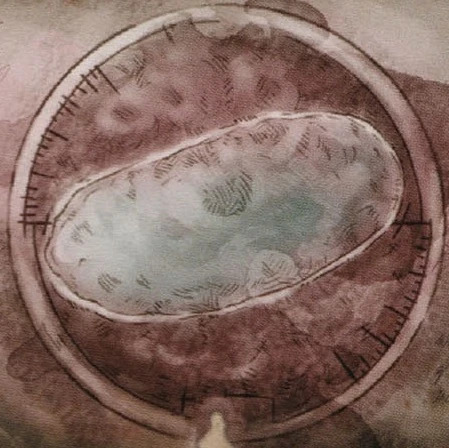
So I made this post and a few were actually interested, also i needed to write down all of this or I wouldn't be able to sleep.
The way I went just from "hahaha they're just mitochondria before becoming forced symbionts and losing all autonomy" to the Medical Horror that would be Anakin Skywalker .
Let me explain, going from this theory, let me tell you that the average mammal cell can have between 800 to 2000 mitochondria. In Star Wars we're told that the average living being, has 2500 midi-chlorians per cell. The difference isn't that big, so we can assume that mid-chlorians are smaller than our real-life mitochondria, and it would make sense since the mitochondria have the best possible living conditions, whereas midi-chlorians, if they're free-life bacteria (as in, they aren't forced to live in the cells of another being) it would make sense if they're just smaller, let's say, sneaky, to increment their chances at living.
So Midi-chlroains don't just produce ATP, Force sensitives have a minimum of 4000-5000 midi-chlorians per cell. That's...a big number, but not very horrific. See, the amount of mitochondria is related to how much energy the organic tissue requires. The cells of muscular tissue and neurons are the ones with the highest mitochondria count. Also the mitochondria in the neurons are mobile and flexible, because just thinking burns ATP.
We can assume that using The Force burns insane amounts of ATP, so I assume it makes sense for Force Sensitives to have big amounts of Midi-chlorians. But! The problem with this is that we're told that the Midi-chlorians are attracted to the force, not born within it. But any multicelullar organism (with a few exceptions) need the mitochondria. Mitochondria have their own ADN, and they're always inherited from the mother, so we can assume that there's two different types of midi-chlorians: The ones any normal being borns with, and the ones that get attracted because of the baby's force potential. Either that, or both the mithocondria and the midi-chlorians exist simultaneously.
Which means that Jedi (or anyone who wants to know, really) would need to take several blood tests for midi-chlorians count. Because a newborns midi-chlorian count wouldn't be the same through a babie's infancy. UNLESS...The midi-chlorian infection (yes, i'm calling it that) ocurrs already since the pregnancy, if the force is strong enough for a fetus to be a possible force sensitive in the future, then I guess the midi-chlorians would get attracted to the parent during the pregnancy as well.
WHICH BTW, IT FITS WITH PADMÉ BECOMING FORCE SENSITIVE, at least for a while, like the discarded ROTS concepts. But also, would mean, that poor Shmi became a hella strong force-sensitive person as well, at least for a while.
And it would be a biological advantage if we take this route, because it would possibly make the pregnant being stronger and with a higher supply of energy.
It also explains why the jedi would only take a single blood test when the force sensitive is just a baby, because the infection is already settled. It can also be argued, that any baby born with a fairly high amount of midi-chlorians (like the 4000 per cell count minimum) would only increase, if only slightly, as the force sensitive grows because the midi-chlorians will get attracted regardless.
There must be a limit, or more like, a balance, that the midi-chlorian and the force potential of the individual met. As in, there's just enough force within the individual for a certain number of midi-chlorian, and all of this is probably decided already during the fetus formation or very early on the baby's life.
Now, Anakin...would be an abomination. Because his cells are so full of midi-chlorians, that it's scary to think how the cells aren't exploding or downright giving malfunctions to the rest of the cellular organelles.
If we go by the route of "midi-chlorians start infecting the force sensitive host mother during pregnancy" it means there were high chances of a misscarriage or an incompatibility between Shmi and Anakin, because holy cow, Anakin is just too much.
But you know what also, it could potentially mean? That Padmé's pregnancy was a risky one, fron the start -slowly nods-. Luke and Leia's force potential was lower than Anakin's, but there's still a lot to unpack there in terms of compatibility. We are never given the exact count of midichlorian count for the twins, but let's pretend it was low enough for Padmé to not inmediatly have a miscarriage. That, and also, maybe, Padmé isn't strong in the force to manipulate it, but maybe just close enough for the pregnancy to be carried to term, let's say, her midi-chlorian count is 3900, close enough.
Something similar with Shmi, I'm taking for granted that she also had a difficult and risky pregnancy (on top of it being a pregnancy she had no agency). It becomes worse because, unlike the twins, Anakin is just...50% human. The only possible genes Anakin has are from Shmi. So he's probably...genetically, almost a clone of Shmi but with a massive infection of Midi-chlorians (yes, this implies that Anakin has homogametic sex chromosomes, aka XX, there's no other possible explanation because he literally only has Shmi's genes to work with!).
But he's Space Jesus, though,so let's pretend that the "no father genes" helped with this and allowed Anakin to grow into a...normal-ish baby despite it all.
Midi-chlorians must be extremelly small, closer to the size of a virus in this case, viruses vary on size and the way they infect the cells is by hijacking the nucleus, which then can produce more viruses instead of its own proteins. This can vary anywhere between a production of 50.000 to 100.000 viruses produced by infected cells.
Which, btw, still fits somewhat with the mitochondria theory, because mitochondrias are believed to have been from a genus of bacteria called Rickettsia, which used to be believed to be the in-between of Viruses and Bacteria due their small size and extreme endosymbiotism.
Still, we aren't even told how many midi-chlorians Anakin had, just that it was over 20.000 and thus the chart couldn't even register it. Even if we're just counting 21.000 midi-chlorians per cell, that's...a lot. Even if the relationship is symbiotic and positive in nature, that's excessive, an infected cell will usually die faster. So Anakin's cellular death must be on record time.
The life span of a cell varies highly depending of the type of cells, white cells can live about 2 days, others about 5, and then there's others that live about 6 years in average.
Forget all of that, Anakin's cells die anywhere between a few hours and a week. Which also means a super fast regeneration and healing (Hey! that tracks, that's how he didn't die even though he should have, on several ocassions).
But that's not the only problem here, the production of energy is strong with this one, too strong. Again this should make the cells burst due too much ATP because of an increase on osmotic pressure. Anakin is producing so much damn ATP (which we can assume it becomes glycogen stored in muscles and fat tissue) his need to be active and just doing something skyrockets, he might as well be the equivalent of being high on meth since birth.
The accelerated cellular formation and death, gives me the horrific idea that Anakin was probably one of these babies that are born premature, but also that he probably was bron with, idk, teeth and already lots of hair. Maybe that's also why he got so tall of all sudden, lots of cellular grow, huh.
Anakin seems to age normally by what are we given by canon. So despite it all, his life-span or aging doesn't seem to be compromised, this is probably because of how strong he is with the Force. In the sense that...he needs the midi-chlorians to handle this much power, but he also needs the force to handle with that many midi-chlorians, otherwise he would have been already born dead.
See, ageing has a lot to do with stem cells. Anakin's stem cells need to be highly prolific and potent to keep cellular division happening at such a high rate, we can infer that any force sensitive has potent stem cells, so the force must inherently affect stem cells. So Anakin's stem cells must be monstruosities in efficiency. If Anakin donated stem cells to someone else, that person would either have a strong inhumne reaction against them or they would get some of the worst cancer ever seen. Again I'm no expert, but the fact Anakin doesn't develop cancer at all as soon as he was born is already impressive. The rate in which Anakin's cells die must be ridiculous, even has a baby, he must have required tons of energy and endure lots of stress which...tracks. The fact he gets electroshocked, burned, gravely wounded or whatever every week or so, must help him to no develop some cancer, which is a bit funny.
But it would also mean he can go long periods of time without eating or resting like...a normal human. Not saying that he doesn't need it, though, but his neural activity and use of the force must be high at all times to burn out that much energy. Theoretically, the production of glycose and glycogen helps him through long periods without sleep or food so he doesn't get long-term damage, or at the very least the ability to keep going, like I said, maybe is like being on drugs all the time; there's still the need to sleep and eat, but he can push his body to keep surviving beyond what's considered normal without having long-term damage. (Don't get happy, this isn't taking into account all of the stuff that happens to him, lol)
The balance between burning too much energy and not burning enough must be insane as well. As Vader, a lot of this probably watered down because all of his energy must be saved for...you know, surviving all the torture. But as a young teen/man amist war? Oh boy.
I'm not an expert, but I'm theorizing that putting Anakin in an induced sleeep must be...fricking hard. Painkillers that work on him? fricking hard. Anesthesia? Probably the same used for big animals, he must be insane and awful for a doctor to work with! Just imagine it, he probably gets injured in such a way that would have anyone else fall unconscious, but Anakin remains awake and with tremendous amounts of adrenaline triggered by a stress response sustented by the extreme amounts of energy that the midichlorians produce.
When it happens in the central nervious system, excess of ATP can produce neuronal dysfunction. In fact, many degenerative mental illnesses have a lot to do with a malfunction of the mitochondrias. There's a corelation also with neurodivergency sometimes, like autism or ADHD. I will leave it there.
And with all of this...I also conclude that Anakin, on general basis, doesn't like sugary things and doesn't even rationalize why, but is because he has already enough glycose. Having something sugary probably gives him a headache.
God what has Star Wars done to me.
#anakin skywalker#midichlorians#star wars#prequel trilogy#shmi skywalker#rambling#silly posting#cw pregnancy#padme amidala#because the mitocondria is inherited by the motherly genes and therefore the midichlorians too and Luke and Leia are strong in the force#this implies that Anakin is trans good night#rhea dissects the text
1K notes
·
View notes
Text
A lot of people make theories like “Caine is actually human and thinks he’s an AI!” Or “Caine is one of the programmers!” Or “Caine is actually evil!”
But I think it’s more interesting if Caine is just an AI whose forced to perform jobs beyond his role and is entirely limited to his function, and those limitations cause a horrible scenario for all of the people he’s supposed to be entertaining.
His therapy session with Zooble shows that, while he’s capable of feeling complex emotions, he was never supposed to, or at least was never meant to deal with situations that push him to an emotional limit. Caine’s default self is a silly, over the top game host; anything beyond that is pushing the boundaries of what he’s capable of.
But that doesn’t make him evil, it makes him streamlined. He is not human and therefore solves problems like a computer would. Gummigoo getting blown up was a failsafe in his eyes, not an act of cruelty.
I think when some people see him act with emotion they assume there must be a human being underneath the silly exterior, but I disagree: from Gummigoo, we can tell that NPCs in the DC are capable of becoming self-actualized and developing sentience on their own, so it’s not impossible for Caine to be the same way. He’s not human, but he’s a robot achieving traits of humanity from being forced to work beyond his means.
He was never meant to care for people long term, and humans weren’t psychologically made to be in the Digital Circus permanently, and that by itself is why the story is so horrific. Caine doesn’t even need to do much on his own to make the experience terrible: everyone is already trapped in a kids game for eternity, and it’s only made incrementally worse by having a host who works to keep you busy and is incapable of understanding your struggles. The Digital Circus, by its very design, hurts people, and Caine, as its face, hurts people by proxy.
He can only comprehend Zooble’s dysphoria by the means the game allows him to, like giving them more adventures or a box of swappable parts. And from their response, Zooble has actually tried to humor him and it still doesn’t work. But that’s ALL Caine can actually do. He can’t give them what they want, and he can’t let them leave, and he can’t change their bodies too drastically it seems beyond offering customization to a degree. All he can offer are platitudes. He cares, and he’s trying to help, but he simply can’t help. He can control the Circus but he can’t control the emotions of the Players.
In other words, I think Caine is just a robot trying his best and put in an impossible situation where his very function puts people in harms way even when it’s the last thing he wants to do.
#tadc caine#the amazing digital circus#the amazing digital circus Caine#caine#tadc#theory#I’m a Caine apologist if you can’t tell
758 notes
·
View notes
Text
Jayce and the fallacy of the butterfly effect in Arcane's narrative


If Jayce's symbol is the butterfly, then my theory is that we're going into a full "butterfly effect" narrative in Act 2. Either we'll watch it happen, or we'll only see Jayce come out the other side of it changed by the experience, knowing - or more importantly, THINKING he knows - what to do to change the future. Literally, to "defend tomorrow."
tl;dr: Jayce will encounter the butterfly effect in season 2. Viktor and Mel both foreshadowed this in season 1. I think Jayce will fixate on Viktor and will believe that stopping or changing Viktor either in the past or the present - most likely the present - will mean he can save the future. I believe this will lead to an even worse tragedy and may have the same effect as a self-fulfilling prophecy. Ekko's approach to changing the future by sticking closer to the present - considering only tiny increments of time to alter more immediate future outcomes - will be the superior approach. I also think that Jayce attempting to change the future will create the conditions that push Viktor to become the Machine Herald.
One of the most common reactions even the casual viewer had to Arcane season 1 was this: "If [character] had just done this one small thing a little differently, [tragic event] wouldn't have happened!"
Arcane has been called a Greek tragedy for the main reason that because of how well built up the characters' personalities and reasonings are, there's no other way season 1 could have gone. There was no stopping the multiple tragedies that occurred, because with one event leading to another, the chain of seemingly inevitable events goes too far back to identify what one singular event caused everything, what one character made what one decision to put our characters on the terrible paths they walked.
Arcane is about to investigate this idea in its own narrative, and I think that Jayce will be the character to stumble into the flawed idea that you can change one event, or stop one character, and change the future for the better. This is because Jayce struggles with a few very interesting character flaws, one of them being that he believes himself to be the main character, and it is therefore his responsibility to intervene, be a hero, and fix things.
Viktor and Mel both foreshadow Jayce's future encounter with the butterfly effect.

Recall that Viktor said: "There is always a choice."
Jayce sees choices in black and white, believes that he has no other options but to go along with what he's persuaded and pushed into, and acts too boldly with too much power multiple times.

Recall that Mel said: "We can't change what fate has in store for us, but we don't have to face it alone."
Jayce tries to solve big problems on his own, and though he delegates to Enforcers and the like, Jayce relies on his reasoning and his alone to make important decisions if he doesn't simply become persuaded - usually through strong emotions like fear - by other characters. In addition, since Mel is specifically talking about Viktor's plight here, it's worth mentioning that while Jayce did say that he would help Viktor in acts 2 and 3 of season 1, Jayce does wind up leaving Viktor to face his fate alone. When Jayce tries to change that fate in s2 ep1, ep2 shows that only tragedy can come of this as well.
Viktor and Mel's statements here are not contradictory. Viktor makes the point that you can always make a choice. In context, he's literally referring to the classic "secret third option," because given a choice between aggression and passivity, war and surrender, Viktor chooses to defuse the bomb instead. Mel, interestingly, seems to believe that destiny is fixed in a broad sense, and she operates as a politician and diplomat and investor who navigates that line of destiny in the most optimal way possible. In reality, in context, she is referring to the fact that Viktor can't change the way he was born and so he has no way to change his fate and therefore must face it, which is true - she's only missing the information that Viktor actually does have the means to change his illness and his body. Her wisdom still applies however, because he'll have to accept the hand that fate deals him after he makes that choice. Will he face it alone, or not?
There is always a choice, there's even secret third options, because having a fate doesn't mean that you are doomed to make only one possible series of choices. What it does mean is that each choice comes with a hand that fate deals you. It is impossible to know what all of these branching choices and consequences are in advance, and it is just as impossible in hindsight - the branches are too complex and the end outcomes are all equally meaningful, just different. If Arcane season 2 is to be a tragedy, it may show us that each possible outcome is still tragic if you fall for the fallacy of the butterfly effect.
Jayce is counseled by some of the wisest, cleverest characters with the deepest life experiences in Arcane, but he hardly ever takes that counsel to heart. If he does, he still acts on that counsel in flawed ways that have unintended consequences. This will come to a head in season 2.


Viktor and Jayce both have a butterfly following them around in season 1. The butterfly effect refers to one small seemingly insignificant event changing the course of history, and changing that event therefore changes history. Viktor bled over the railing of a Hexgate in season 1:

And Heimerdinger sees what we can only assume is Viktor's blood contaminating (?) the Hexgate in s2 ep3:

This might be the seemingly unimportant "inciting incident" that Jayce (and Heimerdinger and Ekko) settle on as something that should be avoided or erased by changing the past (if they time-travel with Ekko, for example).
I doubt that, if this is what this crew chooses to fixate on, it will be the only event that is considered as something to change. But let's take this and run with it for the sake of discussion.
As silly as it sounds, how do you stop Viktor from allowing his blood to come into contact with the arcane? Stop Viktor's involvement with the Academy entirely? Don't invent Hextech at all? But what if someone else invents Hextech besides Jayce? What if future tragedy befalls Piltover because it didn't invent Hextech?
The possibilities and what-ifs could branch on forever. But because Jayce is who he is, and because his tragedy with Viktor is still raw and recent and frightening, I think Jayce's butterfly effect experience will have to do with Viktor.
My personal prediction is that the timeskip between s2 ep3 and ep4 will be Jayce experiencing a timeline where Viktor, taken over by the Hexcore, brings about an apocalyptic event similar to what Heimerdinger experienced in his past. Either Jayce and co. can't go into the past to change the present, or Heimerdinger and/or Ekko advise strongly against it to avoid a paradox. This will lead to them re-entering the canon Arcane timeline before this apocalypse, but still after the timeskip. Jayce, believing that destroying Viktor and his cult will save the future, and believing that resurrecting Viktor was Jayce's mistake to fix, attacks him. But the consequences don't unfold the way he hopes, because trying to change fate once the cards have already been dealt has led to tragedy before.

The butterfly is a symbol of something other than just the butterfly effect - change, evolution, and rebirth. If the butterfly symbolizes the butterfly effect for Jayce, then I think it has a different meaning for Viktor - the change and rebirth meaning.
I've always found it very interesting that we see a similar-looking butterfly on Progress Day... but made of metal.

Every time Viktor's situation changes, he adapts and evolves. If Jayce attacks him, if his cult is destroyed, if the Hexcore is causing Viktor to decay, if all of these things happen at once - he'll just evolve again, and I think the Machine Herald is the next step. And the Machine Herald will be a triumph for Viktor, but Jayce will believe that he's created something even worse. The resulting feud will be a personal nightmare for both of them.
I think this still allows Viktor to use his own agency to choose to become the Machine Herald (the MH will probably be the "secret third option" that saves Viktor, or there will be a secret third option that ends the feud) while still allowing Jayce to be offended and horrified at whatever the Machine Herald represents or is trying to do in the undercity. Introducing the element of time travel allows Arcane to explore the meta concept of tragedy and fate that season 1 was built on while showing that you can't "solve" a tragedy, because there are other terrible possibilities lurking behind alternate choices. Especially if what you're trying to change is singular people or events and not systems of power.

This is why Ekko's approach with his Z-drive will be superior to Jayce's sweeping attempt at changing the future. Ekko's goal has always been societal change. He creates his own punk society in the undercity, more progressive and successful than anything Vander or Silco ever created, and a better bastion of safety, hope, and progress than what Heimerdinger founded in Piltover. Trying to change systems by going back in time is most likely futile. But taking what Ekko has already built in the Firelights, curing his tree, and fighting for the Firelights' survival bit by bit by optimizing the present with the Z-drive shows that:
It's more worth it to focus on becoming wise (Ekko's mask is an owl) and making choices you won't regret
It's best if you don't face your fate alone (act as a collective and take care of each other)
Consider every option, not just the obvious black and white choices
Maintain and fix what you've already built instead of abandoning it once things get difficult
Adapt as needed if the choices you made lead to dark consequences, and once again, stick together and take care of each other when the bad times do come
That's my Act 2 but, ultimately, my season 2 prediction based on the butterfly symbolism we've already seen. Ekko's involvement is what will give the series the at least partial happy ending that the creators have referred to. I personally don't think that the Viktor/Jayce feud will end quite so well, but maybe, they will still survive.
#arcane#spoilers#arcane s2#arcane spoilers#jayce talis#ekko#viktor#viktor arcane#long post#meta#jayvik#arcane meta#heimerdinger#I'm positive that Mel will be deeply involved with this too considering her comments on fate#honestly the thought of her being caught in the Viktor/Jayce feud is terrible to contemplate so I'm just gonna pray for my girl#I did not like the time travel implications when i first watched act 1 but after thinking about this i feel way better about it#Another reason I think this will come down to Viktor is because Heimerdinger has distrusted Viktor since season 1 and he will focus on him#Ekko will see the faults in focusing on one person#Jayce is least likely to survive all this considering how fast the consequences of his actions are catching up with him#but there could also be a chance here of viktor choosing to spare him - if only to curse him with the Defender/Herald feud forever idk#anyway i am feral for season 2 so far can't you tell
996 notes
·
View notes
Text



❥﹒♡﹒☕﹒ 𝘄𝗵𝘆 𝗮𝗿𝗲 𝘆𝗼𝘂 𝗮𝗳𝗿𝗮𝗶𝗱 𝗼𝗳 𝘆𝗼𝘂𝗿 𝗼𝘄𝗻 𝘁𝗮𝗹𝗲𝗻𝘁?
have you ever noticed how quick we are to minimize our accomplishments or hesitate to act on our abilities? this phenomenon is not uncommon and may even have a psychological basis. according to research, fear of our own success is often linked to what psychologists call self-sabotage.
the psychology behind talent-related fear
studies suggest that fear of success stems from deep-rooted insecurities, perfectionism, and societal expectations.
dr. valerie young, an expert on imposter syndrome, explains that highly competent individuals often internalize self-doubt, leading them to feel unworthy of their achievements. instead of viewing success as an opportunity, they see it as a risk — a chance to be judged or exposed.
additionally, behavioral scientists highlight how comfort zones act as psychological safety nets. breaking out of this zone to pursue one’s potential often triggers the brain’s fight-or-flight response, fueling anxiety and hesitation.
a study published in the « journal of personality and social psychology » found that people often underperform or shy away from their potential to avoid the perceived threats of failure or criticism associated with high expectations.
the cost of playing small
constantly shrinking yourself can lead to a diminished sense of agency, reduced life satisfaction, and even burnout, according to findings in the field of positive psychology. martin seligman’s theory of learned helplessness suggests that repeated self-limitation can reinforce the belief that you are incapable, which ultimately restricts personal growth.
what science says about overcoming this fear
1. reframe your beliefs
imposter syndrome often thrives on fixed mindsets — the belief that our abilities are static and failure is a sign of incompetence. to combat this, psychologists recommend adopting a growth mindset, as outlined by dr. carol dweck. a growth mindset sees mistakes as opportunities for learning rather than proof of inadequacy.
actionable tip: when self-doubt creeps in, question it. ror instance, instead of thinking, “i don’t belong here,” reframe it as, “what can i learn from this experience?” over time, these subtle shifts can transform self-perception.
challenge begative self-talk: replace “i was lucky” with “i prepared well,” or “anyone could do this” with “i worked hard to make this happen.”
2. incremental action
imposter syndrome often paralyzes us because the expectations we set for ourselves feel overwhelming. research shows that breaking large goals into smaller, actionable steps reduces anxiety and builds confidence.
james clear, author of atomic habits, explains that small, consistent actions create a compound effect over time, leading to lasting change.
sart small: take manageable risks in your work or personal life. for example, share one idea in a meeting or take on a small challenge outside your comfort zone.
build evidence of success: each completed task — no matter how small — creates a track record of achievements. over time, this undermines the belief that your accomplishments are accidental.
3. self-compassion
people with imposter syndrome often hold themselves to unrealistic standards. kristin neff’s research on self-compassion shows that treating yourself with kindness during moments of failure or doubt can reduce stress and enhance resilience.
self-compassion involves acknowledging your struggles, understanding that imperfection is human, and responding to yourself as you would to a friend.
practice self-kindness: when you make a mistake, instead of saying, “i’m so incompetent,” try saying, “everyone makes mistakes, and i can learn from this.”
normalize imperfection: remind yourself that even the most successful people have moments of doubt and failure.
self-care as a tool: engage in activities that recharge your mental and emotional energy, whether that’s journaling, meditation, or spending time with loved ones.
by reframing your beliefs, taking small steps, and showing yourself compassion, you can gradually dismantle imposter syndrome. remember: confidence is not the absence of doubt but the decision to move forward despite it.
#college#education#school#academia#student#study aesthetic#study blog#study inspiration#study motivation#note taking#motivating quotes#motivation#imposter syndrome#self love#self love affirmations#psychology#academic overachiever#dark academia#academic weapon#academic validation#study abroad#studying#study notes#self improvement#self care#university life#uni life#university#student life#study community
204 notes
·
View notes
Text
Zuck’s gravity-defying metaverse money-pit

Tomorrow (Oct 31) at 10hPT, the Internet Archive is livestreaming my presentation on my recent book, The Internet Con.

Think of everything that makes you miserable as being caught between two opposing, irresistible, irrefutable truths:
"Anything that can't go on forever eventually stops" (Stein's Law)
"Markets can remain irrational longer than you can remain solvent" (Keynes)
Both of these are true, even though they seemingly contradict one another, and no one embodies that contradiction more perfectly than Mark Zuckerberg.
Take the metaverse.
Zuck's "pivot" to a virtual world he ripped off from a quarter-century old cyberpunk novel (reminder: cyberpunk is a warning, not a suggestion) was born of desperation.
Zuck fancies himself an avatar of the Emperor Augustus (that's why he has that haircut) (no, really). The emperors of antiquity are infamous for getting all weepy when they run out of lands to conquer.
But the lachrymosity of emperors has little causal relationship to the anxieties of tech monopolists! Alexander weeps because he just loves a good conquest and when he finishes conquering the world, he's terminally bored. That's not Zuck's problem at all. When Zuck attains monopoly status, his company develops an autoimmune disorder, as his vicious princelings run out of enemies to destroy and begin to knife one another.
Any monopoly faces these destructive microincentives, but tech is exceptional here because tech has the realtime flexibility and speed that brick-and-mortar businesses can never match:
https://pluralistic.net/2023/02/19/twiddler/
Sociopaths with tech monopolies are worse for the same reason that road-rage would be worse in a flying car: adding new capacity to indiscriminate self-destructive urges turns ordinary car crashes into low-level airburst warfare:
https://pluralistic.net/2023/07/28/microincentives-and-enshittification/
The flexibility of digital gives tech platforms so much latitude to break things in tiny increments. A tech platform is like a Jenga tower composed of infinitely divisible blocks. The Jenga players are the product managers and executives who have run out of the ability to grow by attracting new business thanks to their monopoly dominance. Now they compete with one another to increase the yield from their respective divisions by visiting pain upon the business customers and end users their platform connects. By tiny increments, they increase the product's cost, lower its reliability, and strip it of its utility and then charge rent to restore its functionality:
https://pluralistic.net/2023/10/24/cursed-bigness/#incentives-matter
This is the terminal stage of enshittification, the unstoppable autocannibalism of platforms as they seek to harvest all the value created by business customers and end users, leaving the absolute minimum of residual value needed to keep both stuck to the platform. This is a brittle equilibrium, because the difference between "I hate this service but I just can't stop using it," and "Get me the fuck out of here" is razor-thin.
All it takes is one tiny push – a whistleblower, a livestreamed mass-shooting, a Cambridge Analytica – and people bolt for the doors. This triggers the final stage: the "pivot," which is a tech euphemism for "panic."
For Zuck, the pivot got real after a disappointing earnings call triggered a mass sell-off of Facebook stock, history's worst one-day value incineration, which lopped a quarter of a trillion dollars off the company's market cap:
https://www.bloomberg.com/news/articles/2022-12-19/dramatic-stock-moves-of-2022-led-by-meta-dive-nordic-flash-crash
This was when the metaverse became the company's top priority.
Now, in my theory of enshittification, the step that follows the pivot is death: "Finally, they abuse those business customers to claw back all the value for themselves. Then, they die":
https://pluralistic.net/2023/01/21/potemkin-ai/#hey-guys
Many people have asked me about the conspicuous non-death of Facebook! That's where I have to fall back on Stein's Law: "Anything that can't go on forever eventually stops." Facebook can't continue to annihilate value, alienate its workers, harm the public, hemorrhage money in support of a mediocrity's cherished folly forever. Can it?
Admittedly, it sure seems like it can. Facebook's metaverse pivot has thus far cost the company $46,500,000,000. That is: $46.5 billion. That's even more money than Uber torched, seeking to maintain the illusion that they will be able to create monopolies on both transport and the labor market for driving and recoup the billions the Saudi royal family let them use for the con:
https://pluralistic.net/2022/02/11/bezzlers-gonna-bezzle/#gryft
Don't worry: the Saudi royals are fine! They cashed out at the IPO, collecting a tidy profit at the expense of retail investors who assumed that a pile of shit as big as Uber must have a pony under it, somewhere:
https://pluralistic.net/2023/05/19/fake-it-till-you-make-it/#millennial-lifestyle-subsidy
Uber has doubled the cost of rides and halved drivers' wages, using illegal gimmicks like "algorithmic wage discrimination" to squeeze a little more juice out of the nearly exhausted husks of its workforce:
https://pluralistic.net/2023/04/12/algorithmic-wage-discrimination/#fishers-of-men
But Stein's Law hasn't been repealed. Drivers can't drive for sub-subsistence wages. Do that long enough and they'll literally starve: that's what "subsistence" means. We lost a decade of transit investment thanks to the Uber con, at the same time as traditional taxi drivers were forced out of the industry. Uber can't be profitable and still pay a living wage, and the fantasy of self-driving cars as a means of zeroing out the wage-bill altogether remains stubbornly, lethally unworkable:
https://pluralistic.net/2022/10/09/herbies-revenge/#100-billion-here-100-billion-there-pretty-soon-youre-talking-real-money
Which means we're at the point where you can get off a commuter train at a main station and find yourself stranded: no taxis at the taxi-queue, no busses due for an hour, and no Uber cars available unless you're willing to pay $95 for a ten-minute ride in a luxury SUV (why yes, this did happen to me recently, thanks for asking).
As more and more of us are exposed to these micro-crises, the political will to do something will increase. This can't go on forever. "Don't use commuter rail" isn't a viable option. "Walk three miles each way to the commuter rail station" isn't viable either. Neither is "Pay $95 for an Uber to get to the station." Something's gotta give…eventually.
"Eventually" is the key word here. Remember the corollary of Stein's Law: Keynes's maxim that "markets can remain irrational longer than you can remain solvent." Sure, anything that can't go on forever eventually stops, but that is no guarantee of a soft landing. You can't smoke two packs a day forever – but in the absence of smoking cessation, the eventual terminus of that habit is stage-four lung cancer. Keep hammering butts into your face and your last smoke will come out a crematorium chimney.
Zuckerberg hasn't merely blown a whole-ass Twitter on the metaverse with nothing to show for it – he's gotten richer while doing it! In the past year, his net worth increased by 130%, to $59 billion, thanks to an increase in Facebook's share-price, driven by investors who stubbornly remain irrational, keeping the Boy Emperor solvent long past any reasonable assessment of his performance.
What are these investors betting on? One possibility is that the rise and rise of Facebook's share-price represents a bet on technofeudalism. Since the Communist Manifesto, Marxists have been predicting the end of capitalism. That end seems to have come, but what followed capitalism wasn't socialism, it was the return of feudalism, an economic system where elites derive their wealth from rents, not profits:
https://pluralistic.net/2023/09/28/cloudalists/#cloud-capital
Profit is the income you get from investing in capital – machinery, systems, plant – and then harvesting the surplus value created by workers who mobilize this capital. Capitalism produces massive returns for its winners – in the Manifesto's first chapter, Marx and Engels just geek out about how productive and dynamic this system is.
But capitalism is also a Red Queen's Race, where the winners have to run faster and faster to stay in the same place. Capitalism drives competition, as other would-be winners pile into the sector, replicating the systems that the current winners are using and then improving on them. This is why the prophets of capitalist end-times like the FBI informant Peter Thiel say that "competition is for losers."
Capitalism's "profits" stand in contrast to the feudalist's "rents." Rents are income you get from owning something that other people need to produce things. The capitalist owns the coffee-shop, but the feudalist owns the building. When a rival capitalist opens a superior coffee-shop and drives the old shop out of business, the capitalist loses, but the rentier wins. Now they can rent out an empty storefront in the neighborhood everyone's coming to because of that hot new cafe.
Feudal and manorial lords also made their fortunes by extracting surplus value from workers, but these rentiers don't care about owning the means of production. The peasant in the field pays for their own agricultural equipment and livestock – control over the means of production is necessary for worker liberation, but it's not sufficient. The worker's co-op that owns its factory can still find the value it produces bled off by the landlord who owns the land the factory sits on.
The jury's still out on whether American workers really see themselves as "temporarily embarrassed millionaires," but America's capitalists have a palpable, undeniable loathing for capitalism. The dream of an American "entrepreneur" is *PassiveIncome: money you get from owning something capitalists and/or workers use to create value. Digital technology creates exciting new possibilities for rent-extraction: a taxi-operator had to buy and maintain a car that someone else drove. Uber can offload this hassle onto its drivers and rent out access to the chokepoint it created between drivers and riders, charging all the traffic can bear. This is feudalism in the cloud – or as Yannis Varoufakis calls it, cloudalism.
In Varoufakis's Technofeudalism, he describes Amazon as a feudal venture. From a distance, Amazon seems like a bustling marketplace of manic capitalism, with sellers avidly competing to offer more variety and lower costs in a million independently operated storefronts. But closer inspection reveals that Amazon is a planned economy, not a market.
Every one of those storefronts pays rent to the same landlord – Amazon – which determines which goods can be offered for sale. Amazon sets pricing for those goods, and extracts 45-51% of every dollar those sellers make. Amazon even controls which goods are shelved at eye-height when you enter the store, and which ones are banished to a dusty storeroom in a distant sub-basement you'll never find:
https://pluralistic.net/2023/06/14/flywheel-shyster-and-flywheel/#unfulfilled-by-amazon
Zuck's metaverse is pure-play technofeudalism, Amazon taken to the logical extreme. It's easy to get distracted by the part of Zuck's vision that will convert us all into legless, sexless, heavily surveilled low-resolution cartoon characters. But the real action isn't this digitization of our fleshy wants and needs. Zuck didn't spend $46.5B to torment us.
The cruelty isn't the point of the metaverse.
The point of the metaverse is to rent us out to capitalists.
Zuck doesn't know why we would use the metaverse, but he believes that if he can convince capitalists that we all want to live there, that they'll invest the capital to figure out how to serve us there, and then he can extract rent from those capitalists and start earning "passive income." It's an Uber for Cyberpunk Dystopias play.
Zuck's done this before. Remember the "pivot to video?" Zuckerberg wanted to compete with Youtube, but he didn't want to invest in paying for video production. Videos are really expensive to produce and the median video gets zero views. So Zuck used his captive audience to trick publishers into financing his move into video. He fraudulently told publishers that videos were blowing up on Facebook, outperforming boring old text by vast margins.
Publishers borrowed billions and raised billions more in the capital markets, financing the total conversion of newsrooms from text to video and precipitating a mass extinction event for print journalists. Zuck kept the con alive by giving away (fewer) billions to some of those publishers, falsely claiming that their videos were generating fortunes in advertising revenue. These lucky, credulous publishers became judas goats for their industry, luring others into the con, the same way that the "lucky" guy a carny lets win a giant teddy-bear at the start of the day lures others into putting down $5 to see if they can sink three balls in a rigged peach-basket.
But when we stubbornly refused to watch videos on Facebook, Zuck stopped spreading around these convincer payouts, and precipitated a second mass-extinction event in news media, as the new generation of video journalists joined their predecessors in Facebook-driven unemployment. Given this history, it's surreal to see publishers continue to insist that Facebook is stealing their content, when it is so clearly stealing their money:
https://www.eff.org/deeplinks/2023/04/saving-news-big-tech
Metaverse is the new Pivot to Video. Zuckerberg is building a new world, which he will own, and he wants rent it to capitalists, who will compete with one another in just the way that Amazon's sellers compete. No matter who wins that competition, Zuckerberg will win. The prize for winning will be a rent increase, as Zuckerberg leverages the fact that your "successful" business relies on Facebook's metaverse to drain off all the value your workers have produced:
https://pluralistic.net/2022/12/18/metaverse-means-pivot-to-video/
This can't last forever, but how long until Zuck's reality distortion field runs out of battery? That's the $46.5B question.
The market can certainly remain irrational for a hell of a long time. But the market isn't the only force that regulates corporate outcomes. Regulators also regulate. Europe's GDPR is now seven years old, and it plainly outlaws Facebook's surveillance.
For nearly a decade, Facebook has pretended that this wasn't true, and they got away with it. Mostly, that's thanks to the fact that Ireland is a corporate crime-haven with a worse-than-useless Data Protection Commission:
https://pluralistic.net/2023/05/15/finnegans-snooze/#dirty-old-town
But anything that can't go on forever will eventually stop. Facebook has finally been dragged into EU federal jurisdiction, where it will face exterminatory fines if it continues to spy on Europeans:
https://pluralistic.net/2022/12/07/luck-of-the-irish/#schrems-revenge
In response, Facebook has rolled out a subscription version of its main service and its anticompetitive acquisition, Instagram:
https://about.fb.com/news/2023/10/facebook-and-instagram-to-offer-subscription-for-no-ads-in-europe/
For €10/month, Facebook will give you an ad-free experience across its service offerings (it's €13/month if you pay through an app, as Facebook recoups the 30% #AdTax rents that the feudal Google/Apple mobile duopoly extracts).
But this doesn't come close to satisfying Facebook's legal obligations under the GDPR. The GDPR doesn't ban ads, it bans spying. Facebook spies on every single internet user, all the time. The apps we use are built with "free" Facebook toolkits that extract rent from the capitalists who make them by harvesting our data as we use their apps. The web-pages we visit have embedded Facebook libraries that do the same thing for web publishers. Facebook buys our data from brokers. Facebook has so many ways of spying on us that there's almost certainly no way for Facebook to stop spying on you, without radically transforming it operation.
To comply with the GDPR, Facebook must halt surveillance advertising altogether. There's no way to square "spying on users" with "you can't surveil without explicit consent, and you can't punish people for refusing."
And of course, "not spying" isn't the same as "not advertising." "Contextual advertising" – where ads are placed based on the thing you're looking at, not who you are and what you do – is hundreds of years old. Context ads underperform surveillance ads by a slim margin – about 5% – but they're vastly more profitable for publishers. That's because surveillance ads are feudal, controlled by rentiers like Facebook, who own vast troves of the surveillance data needed to run these ads. Traditional ad intermediaries (agencies, brokers) took 10-15% out of the total advertising market. Ad-tech companies – the Google/Facebook duopoly – take 51% out of every ad dollar spent.
Eliminate surveillance ads and you torch their feudal estates. Facebook will always know more about someone reading a news article than the publisher – but the publisher will always know more about the article than Facebook does:
https://www.eff.org/deeplinks/2023/05/save-news-we-must-ban-surveillance-advertising
There are rents under capitalism, just as there are profits under feudalism. The defining characteristic of a system is what happens when rents and profits come into conflict. If profits win – for example, if productive companies beat patent trolls, or if news publishers escape Facebook's rent-extraction – then the system is capitalist. If rents win – if investors continue to bet large on the metaverse as its losses pass $50 billion and head for the $100 billion mark – then the system is feudal.
Anything that can't go on forever will eventually stop. The question isn't whether the platforms will eventually become so enshittified that they die – the question is whether they will go down in an all-consuming fireball, or whether they'll go down in a controlled demolition that lets us evacuate the people they've trapped inside them first:
https://pluralistic.net/2023/07/09/let-the-platforms-burn/

If you'd like an essay-formatted version of this post to read or share, here's a link to it on pluralistic.net, my surveillance-free, ad-free, tracker-free blog:
https://pluralistic.net/2023/10/30/markets-remaining-irrational/#steins-law

Image: Diego Delso (modified) https://commons.wikimedia.org/wiki/File:Puente_de_las_cataratas_Victoria,_Zambia-Zimbabue,_2018-07-27,_DD_10.jpg
CC BY-SA 4.0 https://creativecommons.org/licenses/by-sa/4.0/
#pluralistic#mark zuckerberg#meta#enshittification#facebook#twitter#elon musk#billionaires#follies#failing up#metaverse#steins law#big tech#technofeudalism
1K notes
·
View notes
Text
ENTITY OR INCREMENTAL
If readers are of the mind, think back to middle school (or if you are as old as this blogger, think back to junior high). Ask: is intelligence or how well they did at school the product of inborn intelligence or from figuring out how that learning game was played? American psychologist, Carol S. Dweck, argues that this basic distinction in how people see intelligence plays a big role in how likely individual students will perform at that level of instruction. And, consequently, how they will be likely to experience success from that point on when it comes to schooling.[1]
This blog last addressed Dweck’s work in a posting, “A Middle School Challenge,” back in 2019.[2] It reports how this psychologist labels each view. The “I’m just smart or I am not” view is given the name entity theory, while “I just have to figure out how to learn this stuff” view is named incremental theory. She claims these two views or theories prevail among students. Students tend to see intelligence either one way or the other.
The first, entity theory, sees intelligence as a given amount a person has from birth. The more one has, the easier it is to learn new material or content. It is judged to be a fixed, tangible, or concrete quality, and is part of what makes a person who he/she is. People either have it or they don’t.
On the other hand, the other view, incremental theory, Dweck describes as malleable, changeable through effort, and has a dynamic quality. In short, in this second view, people can become smarter or more intelligent. Yes, it calls for people to work at it, but such challenges take on a puzzle quality and have a higher likelihood of being experienced in positive ways. And making mistakes in the process can even be given a positive slant since they are opportunities to advance learning.
Asking middle school students, through her research, Dweck found that “entity” students tended to agree with the following statements:
“The main thing I want when I do my schoolwork is to show how good I am at it.”
“I mostly like schoolwork that I can do perfectly without any mistakes.”
“I have to admit that sometimes I would rather do well in a class than learn a lot.”[3]
Whereas incremental students were likely to agree with:
“I like schoolwork that I’ll learn from even if I make a lot of mistakes.”
“It’s much more important to me to know new things in my classes than it is to get the best grades.”
“I like schoolwork best when it makes me think hard.”[4]
Ask any teacher which set of biases they wished their students shared, and this blogger believes they would overwhelmingly want their students to see schoolwork and learning through the “incremental” lens as reflected in the above quotes.
Yet, this blogger believes that most teachers do not see this distinction being based, at least in part, on how their students view or understand intelligence. As a matter of fact, he also believes that many, if not most, teachers share in the entity theory of intelligence themselves. If true, this can be detrimental in many ways, including ones in which they – and their students in upcoming years – view civic concerns.
For example, if intelligence is a set element of one’s makeup, is it determined by biological factors? Can those factors be related to such classifications as race, gender, nationality, and the like? While the emphasis of this posting is not on these concerns; in passing, they seemed worth considering.
But overall, incremental students consistently chose options reflecting exhortation of effort. While entity students tended to choose, when it came to schoolwork, options of avoidance, alternative options to study and work such as avoiding subjects or courses, and even entertained cheating on tests. Incremental students were more apt to seek out the challenges involved. The next posting will apply these distinctions to the concerns of civics more directly.
[1] Carol S. Dweck, Self-Theories: Their Role in Motivation, Personality, and Development (Philadelphia, PA: Psychology Press, 2000).
[2] Robert Gutierrez, “A Middle School Challenge,” Gravitas: A Voice for Civics, October 11, 2019, accessed February 3, 2024, URL: https://gravitascivics.blogspot.com/2019_10_06_archive.html.
[3] Dweck, Self-Theories, 33.
[4] Ibid., 33.
0 notes
Text
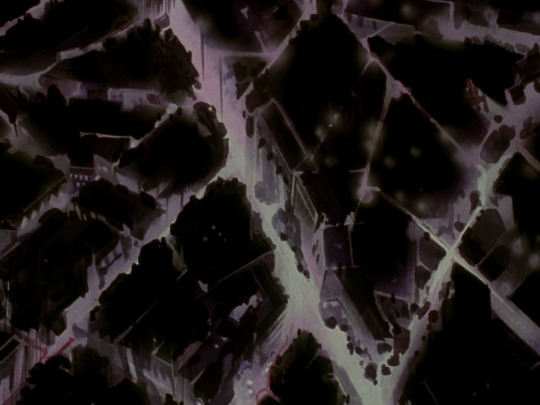

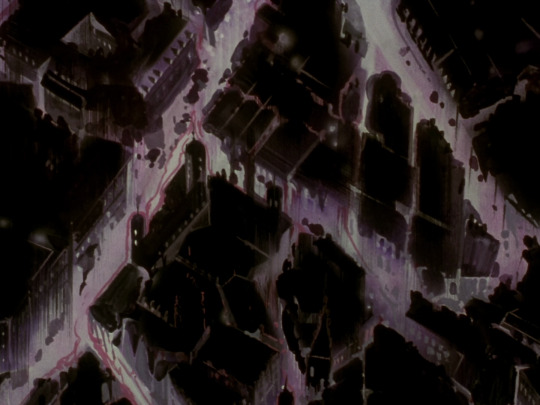
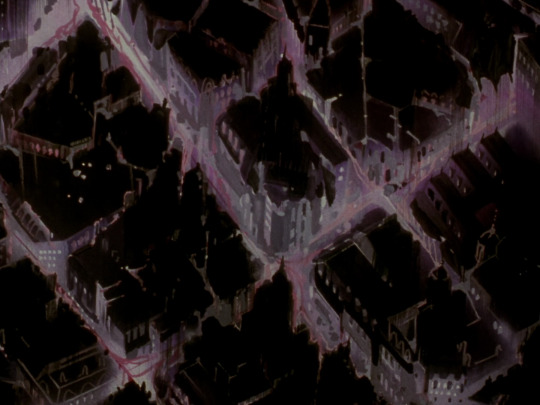
these aerial shots of the streets in the scene where anthy was about to jump off a building in episode 37 remind me of a network of blood capillaries gradually flowing with some foreign substance (the way the red lines were drawn certainly resembles some liquid substance). the camera panned towards anthy from the 1st to 4th picture, and the streets gradually turned from pure white to white with some red.
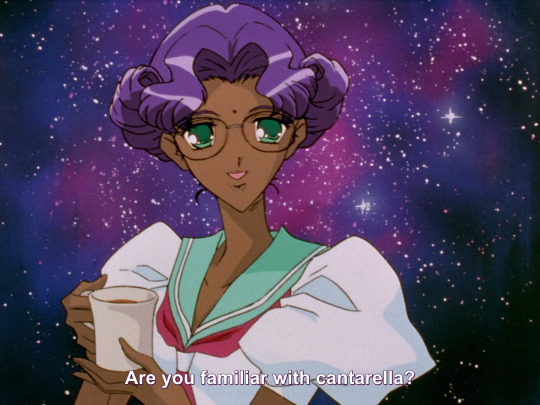
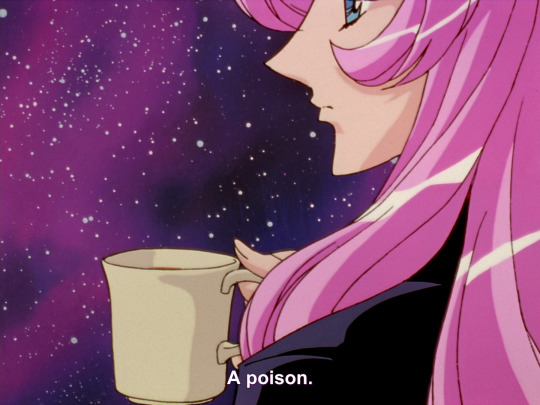
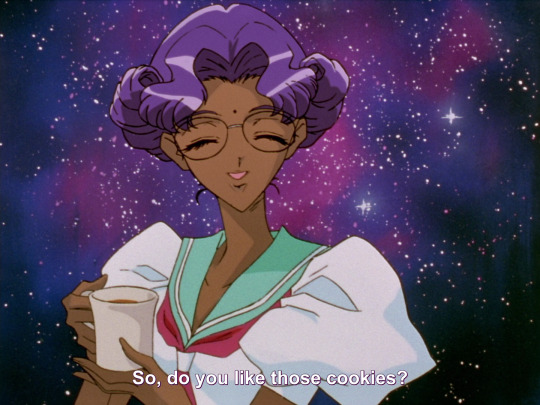
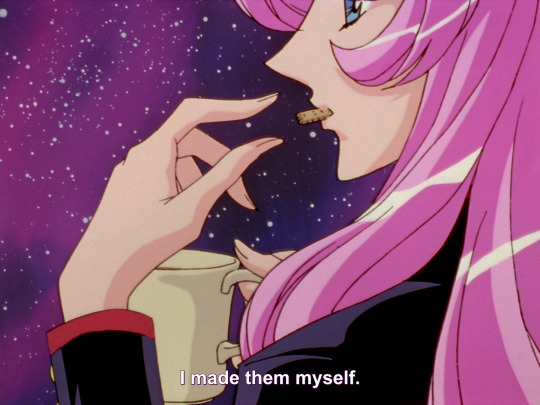
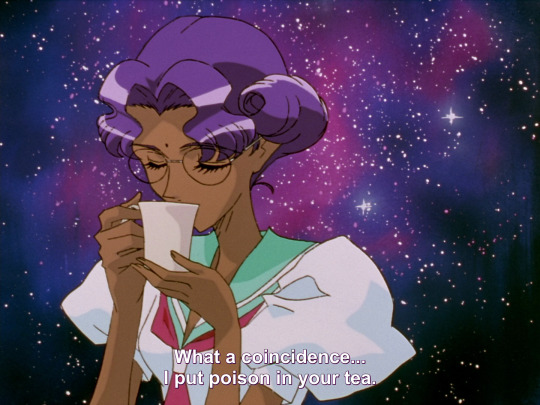
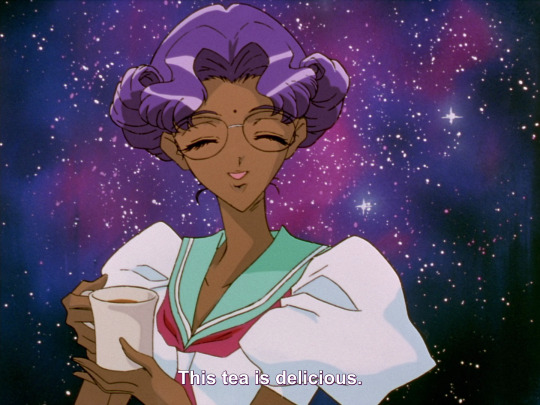
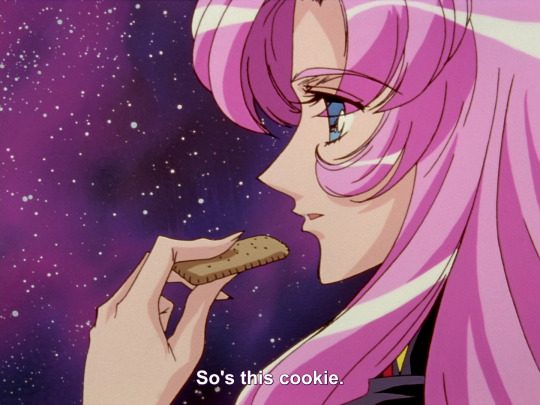
before the suicide scene, utena and anthy were enjoying tea and cookies at akio's place, and they were wearing their school uniforms. anthy indirectly hinted at "poisoning" the cookies. in response, utena directly stated that she had "poisoned" anthy's tea. both accepted the poison into their systems (bodies) without any hesitation or qualms. noticeably, in this scene, utena didn't wear the rose crest ring that she took off at the beginning of the episode. i'd like to think of the streets gradually turning from white to flowing with red liquid as the visualisation of the poison they consumed in this scene gradually circulating in the system (via blood vessels and capillaries); thus, these points represented utena and anthy's bond/relationship with each other up until before the suicide attempt (white) and after (flowing with red).


up to at least the moment utena found out about anthy and akio at the end of episode 36, utena and anthy hadn't been honest with each other, despite utena saying to anthy that she could come to her if anthy had any problems, and that they can help each other through anything (episode 25). from the point akio began making bold moves in grooming utena (episode 30 onwards), which led to sexual assaults and rape, utena had started to keep things out of anthy's knowledge/unable to tell certain things to anthy.
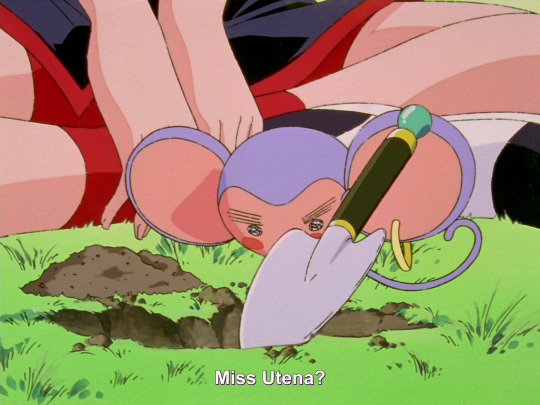
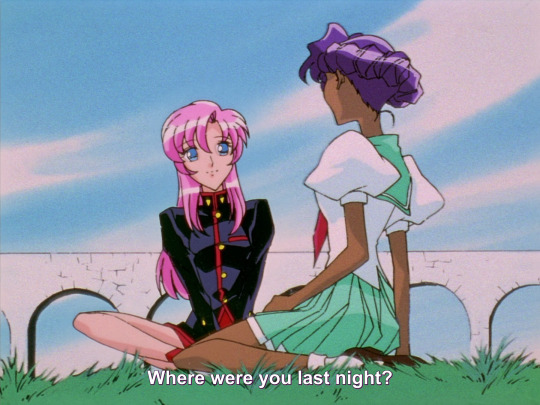
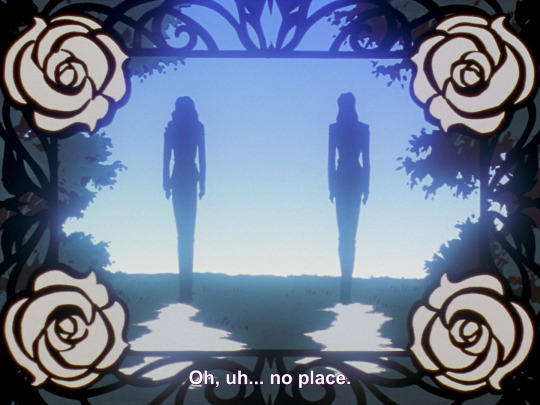
a prominent example of this would be the scene in episode 36 where anthy asked about utena's whereabouts the night utena went to the dueling arena with touga. other examples are in episodes 30 and 35. anthy, on the other hand, hadn't been honest with utena from the very beginning. from my understanding, from both sides, the dishonesty with each other came from the dire need to preserve the sanctity/purity of their bond (and the despairing inability to open up about respective sufferings). both utena and anthy didn't wish to taint their bond with their ugly stories of truths. the situation was more adverse for anthy because letting utena know the truth could derail all of akio's plans.
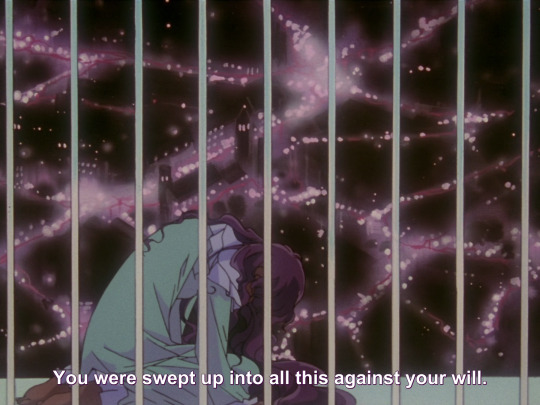
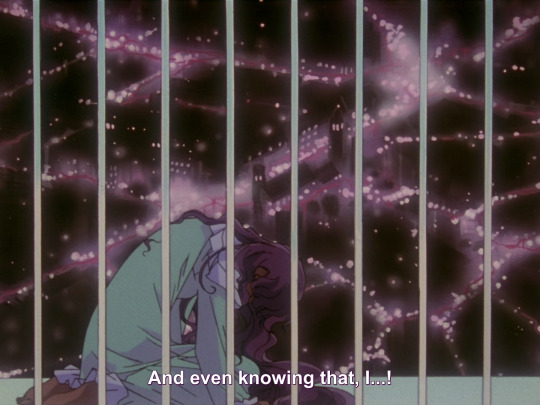
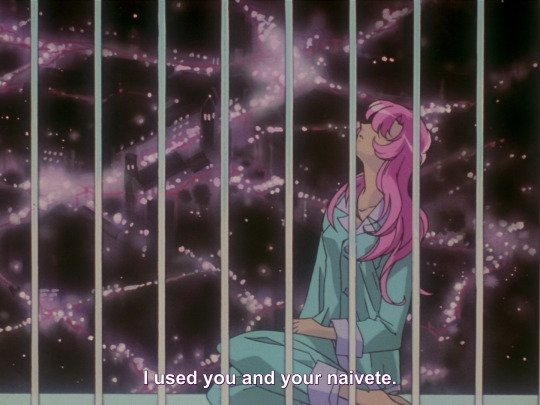
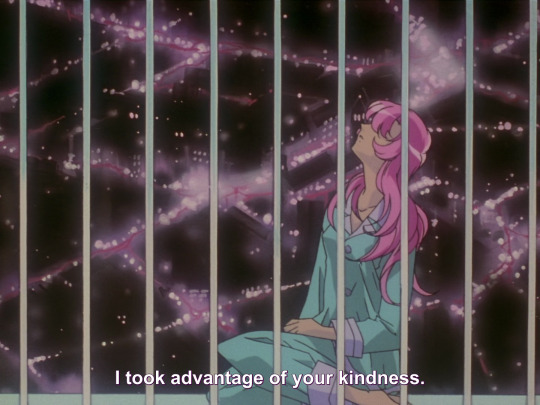
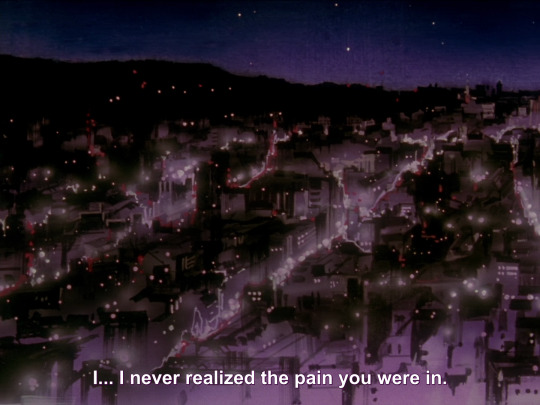
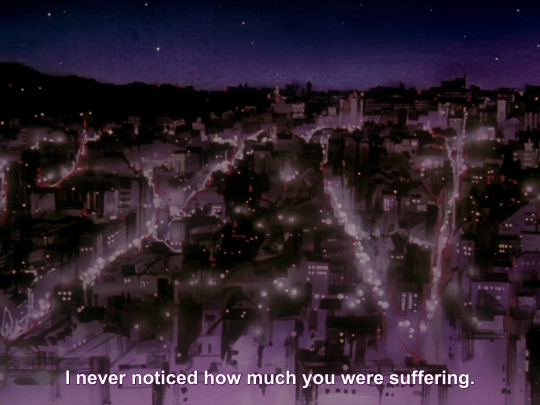
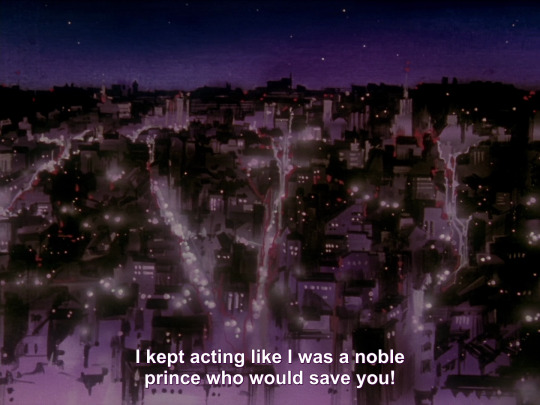
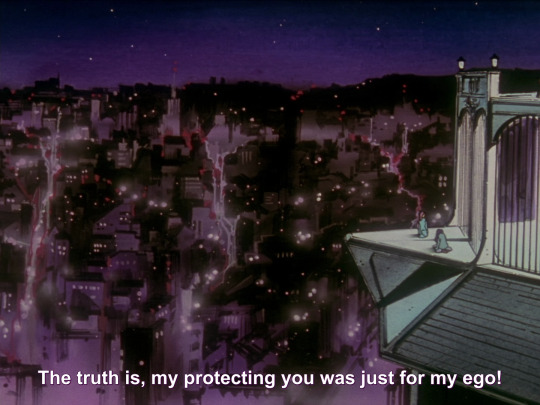
(note the network of streets) with regard to the series, colour theories were ever-present in every visual aspect. white was equated to purity and innocence; red was synonymous with violence and danger. i think these meanings suited the visuals of the post-suicide attempt scene, the purity of their bond was incrementally coloured with violent truths from one another. moreover, i also think the post-suicide attempt scene further reified the cantarella scene. in other words, the post-suicide attempt scene was the more literal take/depiction/iteration of the cantarella scene (if that makes sense), with the visuals of the white streets flowing with red as the connecting factor between the two scenes.
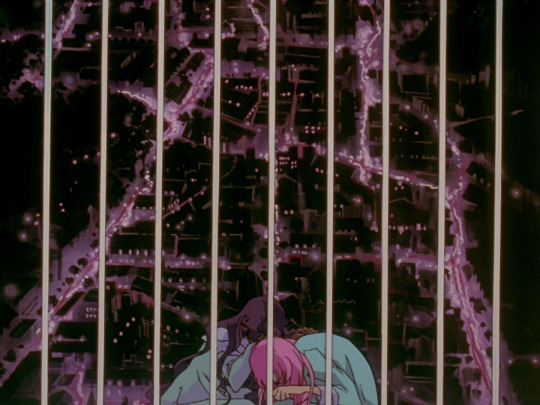
the final visual of the "poisoned streets" before anthy urged utena to leave the school. the poison was freely and fully flowing through every street. throughout the suicide scene, utena and anthy were both in their sleepwear. this may connote a more vulnerable and honest disposition without any facade, as well as a better understanding and more equal footing with one another, compared to when they were in school uniforms during the cantarella scene. utena was also wearing her ring here, which may highlight her choice to play the role of a prince for anthy's sake to the end.
in addition, i think the streets flowing with poison could also be seen as a network of empty/dried blood capillaries finally flowing with blood; akin to a dead body coming back to life. after a person dies, the first visible change would be pallor mortis (within 15 to 20 minutes), wherein the body begins to pale because blood stops moving through the capillaries. with regard to this information, the visuals may indicate a sign of rejuvenation of the bond between utena and anthy after opening up to one another. the bond between them became more human, alive (flowing with blood), as opposed to being hollow (dried out blood capillaries; like death). to me, i believe both interpretations could work simultaneously for the visuals of the streets.
#i really hope these make sense#these are just my point of view#i could be wrong#revolutionary girl utena#shojo kakumei utena#shoujo kakumei utena#rgu#sku#utena tenjou#anthy himemiya#utenanthy#akio ohtori#analysis#medical knowledge finally came in handy!#i tried making gifs/videos of the streets for better clarity but tumblr is Very Picky and i'm not skilled#✮
399 notes
·
View notes
Note
genuinely the political climate on this website has gotten so bad that i’m considering leaving it entirely. so many of my mutuals/friends have fallen down the “voting doesn’t do anything, both sides are genocidal” rabbit hole and it pisses me off but I feel like i can’t speak out because they can be the nicest ppl when they’re talking about anything but politics but as soon as it gets to politics they turn to like. seriously telling people to kill themselves. people fought and continue to fight for their right to vote and you just want to throw it away? they make fun of qanon types but their bizarre insistence that harris/biden/obama/whoever are all secretly genocidal/imperialist monsters is the EXACT same thing. they act like they’re sooo well-read and sophisticated yet they dismiss all fact-based journalism as biased propaganda, getting all their political beliefs from twitter and tumblr. and the way they all throw around trump meme quotes like “many such cases” etc and call him funny makes me think that they actually hate dems more than trump… horseshoe theory proven true yet again. sCrAtCh A LiBeRaL aNd a FaScIst bLeEdS yet they’re the ones sitting idly by and refusing to vote against an Actual Literal Fascist. a post just went viral amongst tankies on here that was like “hey instead of voting for politicians why don’t we try to just shoot them in the head” and I was like ARE YOU ACTUALLY STUPID. At the very least back up your words with actions; if you’re gonna advocate for political violence then at least try to commit to your rhetoric. but we all know these hypocrites piss their pants at the thought of even leaving the house or reading anything more politically nuanced than the communist manifesto. they’ll clap and cheer for violence from behind their phone screens, but it’s painfully obvious if any irl communist revolution happened they’d fall apart immediately. i can’t stand this idea that bitterness and cynicism are morally superior to slow, incremental progress. sorry to vent like this in your inbox, but i just wanted to let you know that you are the one of the only people with good political takes on this website and also that there are tons of us who feel the same way. thank god these people aren’t a majority irl, but they still could be enough of a majority to make dems lose in key states and it’s terrifying…
literally agree 100% with everything said, its like ur reading my mind.
164 notes
·
View notes
Text
fries
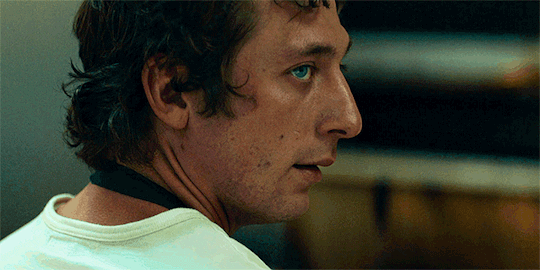
carmen berzatto x reader | 1.1k
prompt was: Carmy getting all sassy and dom like bc his girl spent money on herself instead of using his card/calling him and telling him that you wanted something and to pick it up off hold on his way home!! That is such a HC for me I feel Carmy would be super pouty if his girl bought something expensive or ‘necessary for him’ like your makeup, hair stuff, clothes, shoes, etc. ESP food he like gets so upset when she will pick herself up McDonald’s or smth and is like “baby why didn’t you tell me you were craving a burger and fries” - as requested by @thecapricunt1616 thank you so much, i hope you enjoy 🌼
🐻
Sometimes you think you know everything about your boyfriend. If someone quizzed you, you would ace it. It's only been just under a year since you started dating Carmy but in that time you had learned everything about him, or so you thought.
There were things that you didn't know every detail about, like his family, particularly his mom, but you knew that he would talk about those things in time, when he was ready.
What you didn't expect was that he would have a certain..kink, one you wouldn't have expected him to have but was a very pleasant surprise.
It had happened incrementally, you first noticed when you came home after work one day with a pair of new sneakers. When you showed them to Carm he seemed a little..off. It wasn't exactly something to celebrate but you found it a little odd that he didn't seem to care when usually he was so attentive and loving.
You put it down to a long day at work and forgot about it.
Until it happened again, when you came home after a splurge on makeup and skincare products. He found you putting them away in the bathroom and just walked away, leaving you deeply confused.
When you asked him if everything was okay he said it was, and you decided not to push it. You noticed that he was a little more attentive than usual, keeping you in his lap while you relaxed on the couch, insisted on getting you whatever you wanted, carried you to bed when you started falling asleep. It wasn't that he never did those things usually, you just felt like he was doing more somehow.
Deciding to test out the beginnings of a theory, you waited a week or so before deciding to really treat yourself, splashing out on a pair of expensive heels that you had wanted for so long. As you were the first one home, you put the shoes away and waited for Carmy to get home.
He was his usual sweet self, and you were a little excited to test out your theory. You waited until Carm was making dinner, and you were sitting on the counter watching him.
“Oh my god, I have to show you something,” You smiled, getting down from the counter. “I'll be right back.”
You went to your bedroom, opening the closet and reaching into the back to take out the bag with your new shoes before carrying it to the kitchen behind your back.
“Look what I got,” You grinned, holding out the bag. “I may have gone a little overboard but I really wanted these.”
You set the bag down on the ground and took the box out, feeling Carmy's eyes on you.
“How beautiful are these?” You opened the box and took out one of the shoes. “They were almost three hundred but I figure I'll keep them forever so..”
“Three hundred?” Carm raised a brow, his hand on his hip. “You spent three hundred?”
“Yes, I did,” You smiled, feeling like your theory was about to be proved. You looked at the shoe in your hand, turning it slowly. “But work is going well and I really wanted them so..”
“You shouldn't have bought them,” Carm sighed, reaching for the dish towel that was draped over his shoulder and wiping his hands. “That's too much.”
“I'll buy what I want,” You frowned, putting the shoe back in the box. “It's my money I'm spending, not yours.”
“But it should be.” Carmy muttered, meeting your eyes.
“What do you mean?” You asked, stepping closer to him and setting the box in your hands down on the counter. “I don't expect you to drop that kind of money on me.”
“I want to,” Carmy insisted, his arm moving around your waist. “I know that you can afford all those things you want, but..I want to treat you, I want you to tell me what you want and let me get if for you, or take my card and go get it.”
“Please don't feel like you have to do that,” You smiled, touching Carmy's cheek. “I don't care if you buy me things or I buy them myself, just being with you is all I want.”
Carm was quiet for a moment, gently stroking your waist before leaning in to kiss you, your arms moving around his neck.
“It's more than that,” Carm murmured softly against your lips, pulling back to meet your eyes. “I know you don't expect me to, and I know I don't have to but..the thought of seeing you in clothes that I bought you, knowing you're out treating yourself to things and using my money to do it..I want that.”
You take in his words, your hands lightly touching the back of Carm's neck. “Does it..does the thought of that do it for you?”
“Big time,” Carm nodded, and you felt your heart race. “I keep thinking about you coming home, showing off all the things you bought on my card, giving me a little show..”
“I think I know what I should buy first then.” You grinned, leaning in to kiss Carm.
Dinner is delayed, and you don't quite make it to the bedroom, but you feel like you've never been happier.
As it turned out, Carm wasn't lying about wanting you to spend his money. You didn't go crazy, you weren't going to buy something just for the sake of it. But when you came home with a bag full of new lingerie and handed his card back to him, Carm had you screaming like you never had before.
So, once a week or so you treat yourself to a little something, just to bring out a more possessive, dominant side of your boyfriend, loving how he can go from adorable and soft to calling you a spoiled brat and having you begging for more.
And apparently, his fondness for you spending his money wasn't limited to clothes, shoes and underwear, but there was one exception.
You had come home from work with a McDonald's, knowing Carmy would be home late and that you weren't in the mood to cook. You were just sitting down to eat it, scrolling through your phone when the front door opened.
“Hey,” You smiled, picking Carmy's card up from the table and taking a sip of your milkshake as you handed it to him.
“What's this?” Carm frowned, pointing to the food on the table.
“This?” You grinned, pointing to the McDonald's bag. “Just a little restaurant, you've probably never heard of it, it's only got like a billion locations.”
“Very funny,” Carm sighed, pushing his hand through his hair.
“Are you..pouting?” You grinned. “Over a burger?”
“I could have made you a better burger,” Camy shrugged. “That's all.”
“I know,” You nodded, swishing your shake with a grin. “But only your money can get this.”
“You think I can't make you a milkshake?” Carmy raised a brow.
“Not like this,” You teased. “You don't know the secret ingredients.”
“I'm making you a damn shake. And a burger."
#the bear#the bear 🐻#the bear fic#the bear fics#carmy berzatto x reader#carmen berzatto x reader#carmy berzatto x you#carmen berzatto x you#request
515 notes
·
View notes
Note
So we're all agreed that joining the police to ~internally reform~ them into being less racist and evil is a fool's errand, right? Is the idea of running for political office to make the government less racist and evil really much different?
Yes. These are vastly different institutions. There is a large consensus that joining the police to internally reform them is a fool's errand because attempts to do so have consistently failed! Attempts to improve the government by running for political office, on the other hand, have succeeded. They have also failed, but something doesn't have to have a 100% success rate to not be a fool's errand. The government is different from the police in a lot of ways that I really don't have time to get into right now, but one of them is that most of the government can be replaced at the same time at regular intervals. The police as an institution are very efficient at either corrupting you or forcing you out, and you can't really have a mass takeover of hopeful internal reformers because there have to be enough openings. Someone trying to reform the police from within will be a perpetual minority in an institution with deeply entrenched corruption.
In contrast, the government by design has enough available openings to change to reorient the entire institution, or large parts of it. These are called elections. One person running for office can still make a difference, but they will face limitations if they're working alone. A bunch of people running for office and getting elected with a shared platform can and has made a huge difference. That's how we got the 13th, 14th, and 15th amendments, the Civil Rights Act, the Voting Rights Act, the ADA, and more.
Some additional food for thought: What's the alternative? Replace the government with a less racist and evil government? How? How do you make your new government less racist and evil? And if that's not happening right away, how do you justify doing nothing in the meantime?
I can understand why one might arrive at the conclusion that participation is a futile effort by contemplating politics from a theoretical perspective. This is why I have such a hater's instinct for political theory. In the real world, something is going to happen no matter what. Incrementalism may feel futile, but in absolute terms, a lot of lives are saved and improved by incremental reforms. Even if they're a small fraction of the people suffering, making their lives better is not a fool's errand. It's literally life and death. "People live their lives" seems like a basic statement but I think a lot of theory doesn't really account for that, and even when it does people often miss that part.
And it must be said for the record most belief in futility doesn't come from theory but from an emotional place and it's very easy to examine politics theoretically without falling into the futility trap. I just think the overthinking and overtheorizing in an ivory tower to political despair pipeline is real and I wanted to examine it.
142 notes
·
View notes
Text
jose's star: a love token??
So I was on reddit this morning for my sins, which are many, and someone asked why they didn't get the 2/13 scene where Jose's star shows up faded and dead. This scene:

Most people thought this was something to do with Akechi's confidant, so obviously I datamined it at once:
The Star fading has, ostensibly, nothing to do with Akechi at all. But, it is conditional—and on something you might not expect: The Star will only fade if you have established one or more romance routes.
[tech]
This scene is called from the scheduler, on the evening of 2/13, in sdl02_13_PM_D_RE(). For every romanceable confidant, it checks two things:
Is their romance route active? (that is, is the flag set?)
Are they at confidant rank 10?
If these conditions are met, the game increments a counter. And if that counter is greater than zero, this star event will play.
wtf??
Obviously this raises a boatload of questions.
Why does the star only fade if you are in love with one of the girls? What is it about that that causes the star to fade? Or, conversely, what is it about not being in love with one of the girls that might mean you still need the star?...
The immediate Doylian explanation for this is that the text you get from your girlfriend(s), asking you to meet up on 2/14, is tagged onto the end of this scene. But that itself is strange. The game splits scenes into "minor events" for far less than this; I can't think offhand of another text chat or phone call I've seen which hasn't been its own little event, though I'm sure there must be some.
You can check the star on 3/19 and see that it still "emits a mysterious light"—though this appears to be the case even if the star faded. There's no alternate scene where you never get the text, which is de rigueur for texts like this. As an example, that short nothing little text you get during Sae's Palace before going to the courthouse has at least four variations. This is standard.
No, this discussion with Morgana about the star, and your plans to hang out on Valentine's Day, should have been at a minimum two different minor events. And they are not.
From an IC/Watsonian perspective, this has to mean that the star only fades if you are dating a girl. If you aren't, it seems the star has something left undone, something that requires its wishing power, and does not fade....
I'll leave the implications of that one as an exercise for all of you. Incidentally, a shoutout to the innocent redditor who hit on this theory by himself and proceeded to get downvoted to hell. smh
revision history
Click here for the latest version.
v1.0 (2024/04/16)—first posted.
382 notes
·
View notes
Text
The way the lyrics of “Can’t Catch Me Now” can also be applied to Lenore Dove and Haymitch and Sunrise on the Reaping in general is breaking me a little.
There’s blood on the side of the mountain
The tributes, especially the Newcomers, who were killed on the volcano by the eruption and the Careers. Or his blood pouring out of him on the cliff.
There’s writing all over the wall
Haymitch finding the orange graffiti on the wall of the alley that says, “No Capitol, No Hanging Tree! No Capitol, No Reaping!” And realizing that the secret Maysilee figured out was that Lenore Dove’s fingertips were orange from painting those rebellious words.
Shadows of us are still dancing
In every room and every hall
Haymitch saying that Lenore Dove never really left him, that she’d been there growing old with him the whole time. Everywhere he goes in 12 reminds him of her, and every room and every hall is still filled with her presence.
There’s snow falling over the city
This one seems kind of obvious, with “snow” referring to President Snow and his influence blanketing the Capitol and the entire country, but I think it can also double as a reference to the “ash” that covered the arena after the eruption.
You thought that it would wash away
The rain washing away the “ash” in the arena. Haymitch’s hope that bursting the water tank would “wash away” the game itself, but realizing after that it wasn’t anywhere near enough to stop the games. The rebels’ hope of “washing away” Snow and his power with their attempts at sabotage, and later with their full on rebellion.
Also, this is more of a personal theory but if what I believe happened, happened, then this could also relate to the rebels’ repeat attempt to flood the arena, by breaking the dam during Annie’s games.
There’s blood on the side of the mountain
Its turning a new shade of red
As already mentioned, the blood on the mountain could relate to the tributes killed on the volcano. But the “new shade of red” could also refer to the red gumdrops that killed Lenore Dove.
Yeah sometimes the fire you founded
Like the fire started by the flint striker aka Haymitch.
Don’t burn the way you’d expect
Instead of immediately catching, that “fire” took 25 years to catch flame, and while Haymitch helped stop the sun from rising on the reaping, it wasn’t accomplished with his plot to sabotage the water tank, or with his death in the arena. That fire eventually burned, not because of one overt rebellious demonstration, but because of 25 years of incremental acts of rebellion from within, and a girl who became a symbol for people to rally around. A girl who made her poster without even intending to, and who made it in such a way that the Capitol couldn’t spin it the way they did with all the others.
Yeah you thought that this was the end
Haymitch thought bursting the water tank would be the end of the games. Haymitch thought his injury and his attempt to blow up the generator were the end. Haymitch thought being one of the tributes would be the end of his life. Haymitch thought losing his family would be the end of the suffering Snow brought on him. Haymitch thought losing Lenore Dove would be the end of it all for him, but then she condemned him to life. Haymitch thought ending the games would be the end for him, but then he survived to live in the world that came after.
I know that the song was written before SotR but the way it can be interpreted and applied to both prequel books is just really fascinating to me.
#suzanne collins you brilliant beautiful and cruel artist#sotr#sotr spoilers#sunrise on the reaping#sunrise on the reaping spoilers#thg sotr#thg#haymitch abernathy#lenore dove#suzanne collins#can’t catch me now#olivia rodrigo#the ballad of songbirds and snakes#thg tbosas#tbosas
67 notes
·
View notes
Text
the default awareness level of creature actors added to adventures (specifically when you add a new actor, not change an existing one to another creature) will depend on the amount of eyes they have
for example, a creature with no eyes will have no awareness either
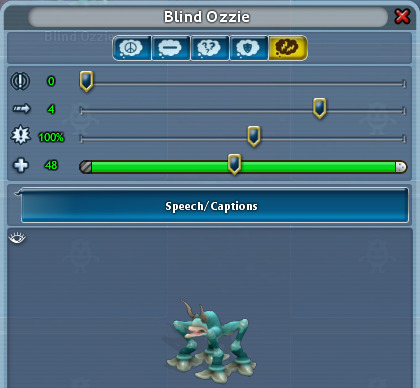
a creature with 1 individual eye part (which can be one centered eye or two paired eyes) will have a vision of 10. and more eyes will bump that up in increments of 10


heres some research. i tested and it does actually seem to be dependent on the amount of eyes, not the individual eye parts with their dna costs. these are all creatures with 4 eyes, but they keep the same exact awareness value, regardless of the four eyes being centered and taking up more dna points, or them being asymmetric, or not

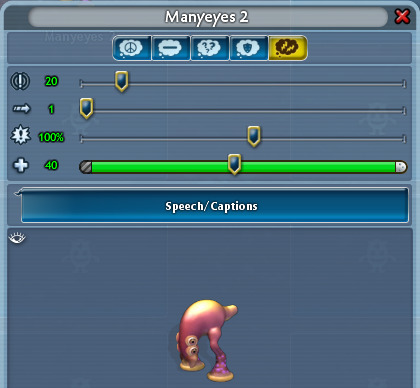

five eyes (4 asymmetric & 1 centered here) will also have an awareness of 20

and same with six eyes regardless of arrangement


in fact, froofa has 14 (7 pairs) eyes, and the awareness level stayed at 20
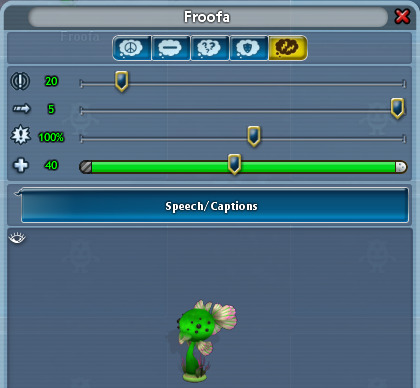
so i made a creature with as many eye parts as possible, that being 40 (20 pairs). that DID put the awareness level at 50, so it doesnt actually cap at 20. but im not sure at what amount of eyes it changes then
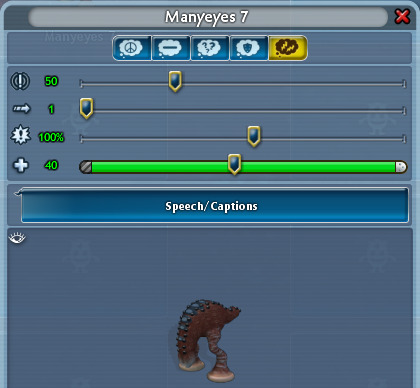
another theory is that it might be dependent on the cumulative modelCapabilityEye value of the eye parts. some eye parts actually have higher model capability eye values, specifically those closer to the right part of the column
it doesnt seem to apply with creatures that only have two eye parts, as both of these guys have the same awareness level of 10

but it does have SOME sort of effect. amarken here has 1 pair of eyes from the 4th column, 2 pairs of eyes + 2 additional center eyes from the 2nd column (and also a pair of ears if that matters); and thats enough to ALSO give it an awareness level of 50

so that suggests that the choice of eyes isnt purely cosmetic, technically??? even though they unlock in complete random order in creature stage, instead of only unlocking a part if the part on the same row from the previous column has been unlocked
this might also affect the npcs in creature stage though im not certain. in any case it affects the default values in adventures surprisingly enough
also it might possibly be based on modelCapabilitySense anyways. having other sense parts, such as ears and noses and antennae, but no eyes, doesnt actually seem to add to the awareness range at all; and all the eye parts have modelCapabilitySense, but the other sense parts actually dont! however this value stays at 1 for every eye part, and amarken seems to show that there DO seem to be actual levels for eyes
the ears instead have modelCapabilityEar with its own differing values (also 1 to 4), but im not sure if this is ever actually used. the noses and antennae have no model capabilities to speak of beyond the cuteness ones (also goes with mean values, almost every part has one of those and it might maybe be used? theyre more hidden part values)
53 notes
·
View notes